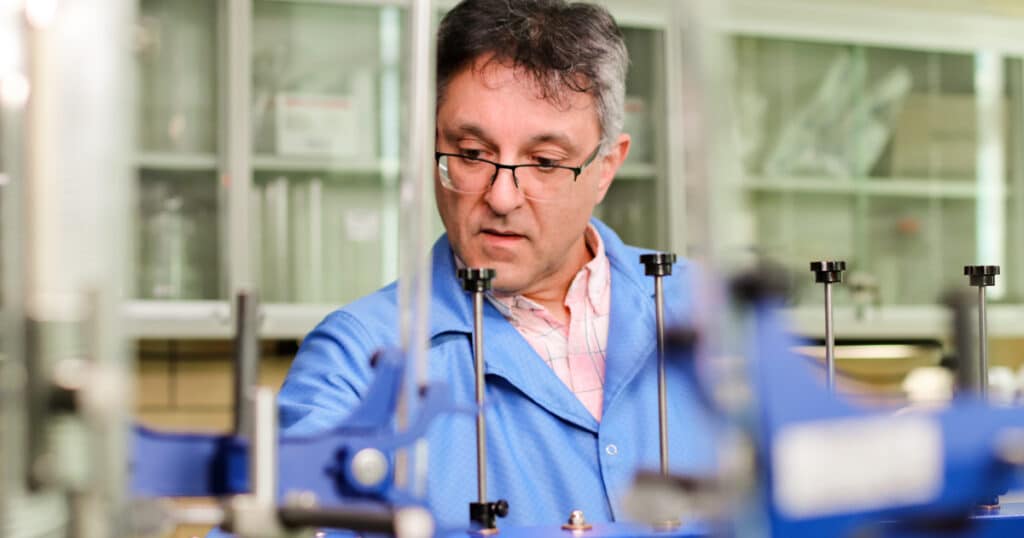
Environmental Engineering, BS
Environmental engineering offers students the opportunity to explore multidisciplinary solutions to solve problems around protecting human health and the environment from the effects of pollution while creating a sustainable future. They tackle problems related to sustainability, managing water supplies, air pollution, and industrial waste.
Program Overview
The environmental engineering curriculum at the Tickle College of Engineering emphasizes the importance of equipping engineers with specialized skills to mitigate the impacts of pollution on human health and the environment and to promote sustainable practices in our communities and society.
This degree will provide students the opportunity to solve engineering problems and contribute to successful projects, with increasing technical and leadership responsibility. Students will learn to adapt to rapid changes in societal needs and engineering technology by leveraging existing and emerging engineering knowledge.
Why study environmental engineering?
The environmental challenges faced by our society have become increasingly complex during the last 50 years. For example, a recent report from the National Academies’ identified the following grand challenges for environmental engineering:
- Create sustainable food, water, and energy
- Curb climate change and adapt to its impacts
- Design a future without pollution or waste
- Create efficient, healthy, resilient cities
- Foster informed decisions and actions
Environmental engineering students will play a role in solving these challenges by working in partnership with other engineering professionals, policymakers, and affected communities. This degree program provides specialized skills to the area of study not included in a traditional civil engineering curriculum and thus allow students to contribute to these grand challenges.
The University of Tennessee, Knoxville, is situated amongst seven lakes, beside the state’s largest river, in the foothills of a national park while still part of a bustling urban environment, placing it in a perfect position to study environmental engineering.
Future program expansion is anticipated to support specific regional needs and institutional strengths, including atmospheric science, watershed and river management, hydropower, and nuclear decommissioning and waste management.
What can you do with a BS in environmental engineering?
As an environmental engineer, you may be involved in designing infrastructure to treat drinking water, wastewater, and stormwater; ensuring compliance to environmental technology, assessing impacts of pollutant, mitigating the effects of climate change, or evaluating the sustainability impact of emerging technologies.
Graduates will go on to work for employers in private consulting and industry leaders, as well as utilities and government agencies (ORNL, TVA, NOAA, the Southeast Regional Climate Center, US Army Corp of Engineers, the USGS, and the Tennessee Department of Environment and Conservation).
Featured Courses
The environmental engineering curriculum will include fundamental topics such as fluid mechanics, environmental chemistry, microbiology, fate and transport of environmental pollutants, environmental systems engineering, and risk assessment, as well as applied topics such as hydrology, water resources engineering, water and waste treatment, air pollution control, solid and hazardous waste management, and energy systems. For a list of all courses, visit the undergraduate catalog.
EF 305 Engineering Approaches to Sustainability
This course covers cross-cutting engineering approaches to analyze and solve current sustainability challenges. Students will learn some of the tools, protocols, and methods that are common to sustainability analysis, particularly focused on engineered systems.
ENVE 381 Environmental Engineering I
This course provides an introduction to drinking water treatment and distribution systems, wastewater treatment and collection systems, air pollution, solid/hazardous waste, and environmental regulations.
ENVE 474 Air Pollution and Control
Students learn fundamentals of air pollution and visibility reduction, air quality laws and regulations, air pollutions sources and impacts, and design of air pollution control technologies for gaseous and particulate pollutants.
ENVE 495 Hydrology
Students are introduced to the hydrologic cycle and key physical processes such as precipitation, evaporation and transpiration, runoff, infiltration, and groundwater. Students learn tools for hydrological measurement, data acquisition, analysis, and interpretation; and applications for water resources management are discussed.
Complementary Minors
The following minors work well with environmental engineering to offer students the opportunity to develop and showcase a multidisciplinary skill set as they enter the next phases of their career. Use the links below to find out more about our programs and what you can do with an engineering degree.
Admissions and Aid
Choosing the right university to pursue an engineering degree is an important decision—and a significant investment. We want to make sure that you have the information you need to both apply and make attending UT affordable.


Ready to Join Us?
See yourself on Rocky Top? We’ve made it easier than ever to apply for admission. Learn more about our admission requirements and the steps to apply to be an Engineering Vol.
